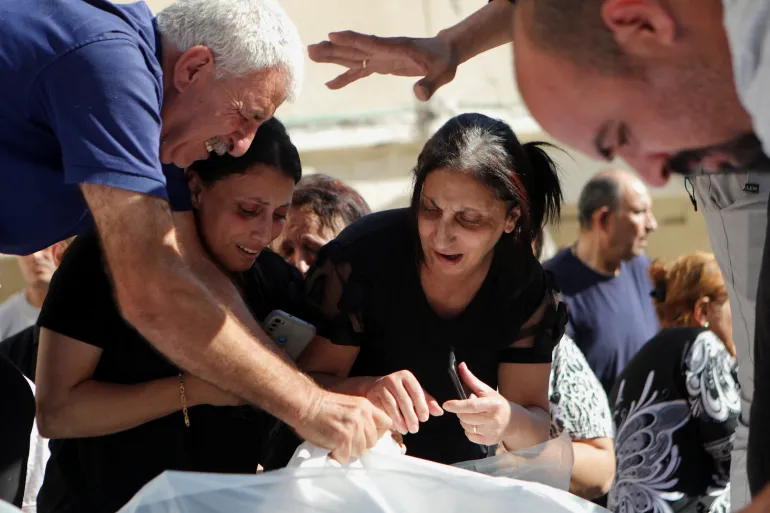The attack by Israel on Gaza might lead to the end of the long-standing presence of Christians in that area.
When bombs from Israel started hitting the busy streets of Gaza City, Diana Tarazi and her family ran to the Holy Family Church, the only Roman Catholic church in Gaza.
The 38-year-old Palestinian Christian, her husband, and three children stayed there with other church members and Muslim neighbors and friends. They tried to comfort their tired children and each other with quiet words of encouragement as the bombings continued.
Diana Tarazi and her family are trying to endure the war in Gaza, seeking safety in a church. However, their sense of security was shattered when a nearby church was bombed, and at least 18 people were killed.
Despite the dangers and bombings, Tarazi refuses to leave, expressing a strong attachment to her country, land, and churches. She says she will only leave the church when she passes away.

‘Threat of extinction’
At least 10,569 Palestinians have been killed in Israeli attacks on Gaza since October 7.
Only 800 to 1,000 Christians are believed to still live in Gaza, constituting the oldest Christian community in the world, dating back to the first century.
Mitri Raheb, a pastor in Bethlehem, says the current conflict might bring an end to the long history of the Christian community in Gaza. He worries that the community is at risk of disappearing due to the Israeli bombings, and even if they survive, many may want to leave the area.
Raheb believes that within this generation, Christianity may no longer exist in Gaza. The region of historic Palestine, where significant events in the Bible occurred, is the birthplace of Christianity.
In the fourth century, Gaza, located along a major trade route with access to a vibrant port and a cosmopolitan city, became a major Christian mission hub. After 1948, when the state of Israel was established and 700,000 Palestinians were displaced from their homes in what became known as the Nakba, or “catastrophe”, more Palestinian Christians joined the community on the coastal enclave.
Estimates have indicated that the number of Christians in Gaza dropped in recent years from the 3,000 registered in 2007, when Hamas assumed complete control of the strip, triggering Israel’s blockade and accelerating the departure of Christians from the poverty-stricken enclave.
Attacks in West Bank ‘quadrupled’
In the West Bank, Christians are on a stronger footing with more than 47,000 people living there, according to a 2017 census.
But violence and persecution have unsettled the community there too. “Attacks on clergy and churches had quadrupled this year compared to last year,” Raheb, whose academic institution documents such events, said.
On January 1, days after Israel swore in the most far-right government in the country’s history, two unidentified men broke into Jerusalem’s Protestant Mount Zion Cemetery and desecrated more than 30 graves, pushing over cross-shaped tombstones and smashing them with rocks.
On January 26, a mob of Israeli settlers attacked an Armenian bar in the Christian quarter of the Old City of Jerusalem, shouting “Death to Arabs … Death to Christians.”
A couple of days later, Armenians leaving a memorial service in the Armenian Quarter were attacked by Israeli settlers carrying sticks. An Armenian was pepper-sprayed as settlers scaled the walls of the Armenian convent, trying to take down its flag, which had a cross on it.
The attacks have continued to escalate, in tandem with Israeli attempts to “silence any voices coming from Palestinians inside Israel”, Raheb said.
“They are Jewish terrorist settlers, but the international community doesn’t recognise them as such because it is part of the same colonial [mindset],” he said, adding that he worried the constant threat of violence would eventually drive out Christianity from the Holy Land.
‘My children were disfigured, dead’
Back in Gaza, Ramez al-Souri is trying to wrap his head around the deaths of his three children, Suhail, Majd and Julie, in the Church of Saint Porphyrius bombing.
“The building contained civilians who did not belong to them,” he said, referring to the Palestinian group Hamas, which launched the surprise attack in southern Israel on October 7 that led to Israel’s bombing.
Al-Souri had hoped his loved ones would be safe in a holy site, but not even the sanctity of its premises could shield his family from Israeli bombardment. The Israeli army is known to have also targeted UN schools sheltering displaced women and children, as well as hospitals, ambulances and aid supplies.
“My three children came out disfigured from the effects of the missile and shrapnel,” he said, still visibly in shock days later.
“I cannot believe that I will not talk and play with them again in my life.”
CREDIT: Aljazeera

